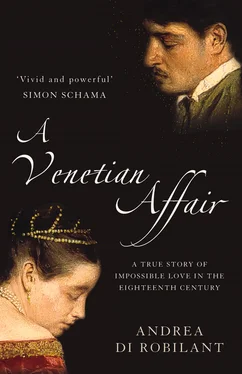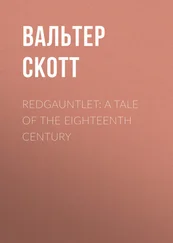A Venetian Affair
A True Story of Impossible Love
in the Eighteenth Century
ANDREA DI ROBILANT

Dedication Dedication Prologue Chapter One Chapter Two Chapter Three Chapter Four Chapter Five Chapter Six Chapter Seven Chapter Eight Chapter Nine P.S. Ideas, Interviews & Features … About the Author Profile of Andrea di Robilant Life at a Glance Top Ten Favourite Books Q and A About the Book A Critical Eye Read On If You Loved This, You Might Like … Find Out More Epilogue Postscript Select Bibliography Index Acknowledgments About the Author Notes Praise Copyright About the Publisher
In memory of my father,Alvise di Robilant
Cover
Title Page A Venetian Affair A True Story of Impossible Love in the Eighteenth Century ANDREA DI ROBILANT
Dedication Dedication Dedication Prologue Chapter One Chapter Two Chapter Three Chapter Four Chapter Five Chapter Six Chapter Seven Chapter Eight Chapter Nine P.S. Ideas, Interviews & Features … About the Author Profile of Andrea di Robilant Life at a Glance Top Ten Favourite Books Q and A About the Book A Critical Eye Read On If You Loved This, You Might Like … Find Out More Epilogue Postscript Select Bibliography Index Acknowledgments About the Author Notes Praise Copyright About the Publisher In memory of my father,Alvise di Robilant
Prologue
Chapter One
Chapter Two
Chapter Three
Chapter Four
Chapter Five
Chapter Six
Chapter Seven
Chapter Eight
Chapter Nine
P.S. Ideas, Interviews & Features …
About the Author
Profile of Andrea di Robilant
Life at a Glance
Top Ten Favourite Books
Q and A
About the Book
A Critical Eye
Read On
If You Loved This, You Might Like …
Find Out More
Epilogue
Postscript
Select Bibliography
Index
Acknowledgments
About the Author
Notes
Praise
Copyright
About the Publisher
Some years ago, my father came home with a carton of old letters that time and humidity had compacted into wads of barely legible paper. He announced that he had found them in the attic of the old family palazzo on the Grand Canal, where he had lived as a boy in the twenties. Many times, my father had enthralled my brothers and me with stories from his enchanted childhood—there had been gondola rides and children’s tea parties and picnics at the Lido, and in the background the grown-ups always seemed to be drinking champagne and giving fancy-dress balls. Equally romantic to us, though much more melancholy, was his account of how my grandparents’ lavish and extravagant lifestyle had begun fraying at the edges. By the early thirties, art dealers were dropping by more and more frequently. Large empty patches appeared on the walls. Pieces of antique furniture were carried out of the house. Even the worn banners and rusty swords our fierce ancestors had wrested from the hated Turks were sold at auction. Eventually, my spendthrift grandfather sold off the palace floor by floor, severing the family ties to Venice and leaving my father so bereft that he yearned for his Venetian heritage for the rest of his life. He never lived in Venice again, but even as an older man he continued to make nostalgic pilgrimages to the places of his childhood and especially to that grand old house, which had long ceased to belong to us, but where the family still kept a few old boxes and crates.
The di Robilant family is actually of Piedmontese origin. The Venetian connection was established at the end of the nineteenth century when Edmondo di Robilant, my very tall and rather austere great-grandfather from Turin, married my great-grandmother Valentina Mocenigo, a formidable Venetian grande dame with beautiful black eyes and a very sharp tongue. The Mocenigos were one of the old ruling families of Venice—“they gave seven doges to the Republic” my father never tired of repeating to us children. Of course, the glorious days of the Venetian Republic were long gone when my great-grandparents married, but the last Mocenigos still had palaces and money and beautiful paintings. So the impecunious di Robilants moved to Venice after World War I and fairly quickly ran through what remained of the Mocenigo fortune.
My father, having grown up in the fading grandeur of Palazzo Mocenigo, came to revere his Venetian ancestry more than the Piedmontese. To him the box of letters was a small treasure he had miraculously retrieved from his Venetian past. And I remember well the look of cheerful anticipation he had on his face when he arrived at our house in Tuscany and placed it on the dining room table for all the family to see.
The letters were badly frayed and had wax marks and purplish traces of wine on them. They looked intriguing. They were not the usual household inventories that occasionally surfaced, like timeworn family flotsam, in some forgotten recess of the palazzo in Venice. We pried them open one by one and soon realized they were intimate love letters that dated back to the 1750s. Some pages were covered with mysterious hieroglyphs that added mystery to my father’s discovery. We spent a rainy weekend cracking the strange cipher and trying to make some sense of the first fragments we were able to read. I remember we were wary of delving into secrets buried so long ago. Yet we labored on because the spell was irresistible.
At the end of that long weekend I went back to Rome, where I was then working as a journalist, while my father took on the task of deciphering and transcribing the cache of one hundred or so letters in his possession. What eventually emerged from his painstaking labor was the remarkable love story between our ancestor Andrea Memmo, scion of one of the oldest Venetian families, and Giustiniana Wynne, a bright and beautiful Anglo-Venetian of illegitimate birth. The letters revealed a deep romantic passion that was at odds with the gallant, lighthearted lovemaking one often thinks of as typical of the eighteenth century. It was also, very clearly, a clandestine relationship: the curious-looking dots and circles and tiny geometric figures scribbled across the pages were a graphic testimony to the fear the two lovers must have felt lest their letters fall into the wrong hands.
When my father began to dig around Andrea and Giustiniana’s story, he soon found traces of their romance in the public archives in Venice, Padua, and even Paris and London. It turned out that students of eighteenth-century Venice had first become acquainted with the relationship through the writings of Giacomo Casanova, who had been a close friend of both Andrea and Giustiniana. In the first years of the last century Gustav Gugitz, the great Casanova scholar, identified the Mademoiselle XCV who figures prominently in Casanova’s memoirs as Giustiniana. 1 Then, in the twenties, Bruno Brunelli, a Venetian historian, found two small volumes of handwritten copies of letters from Giustiniana to Andrea in the archives in Padua. He wrote a book based on those letters and lamented the fact that he had not found Andrea’s letters as well. He consoled himself with the notion that they could not possibly have been “as absorbing as Giustiniana’s.” Judging from her correspondence, he said, it did not appear that Andrea “had the temperament of a great lover.” 2
Other Casanova specialists were drawn to Andrea and Giustiniana. Many combed old bookshops and antique stores hoping to find Andrea’s letters, but in vain. The stash my father had stumbled upon as he rummaged in the attic of Palazzo Mocenigo proved to be the missing part of the story—the other voice. Clearly these letters had at some point been returned to Andrea by Giustiniana and preserved by the family; but they were by no means all of Andrea’s letters. Many had been burnt, and many more had probably been left to rot and then thrown away. But those we had were rich enough to provide a far more complete picture of the love story—and to disprove Brunelli’s contention about Andrea’s temperament as a lover.
Читать дальше













